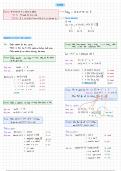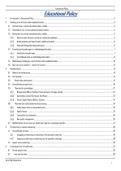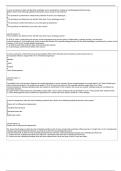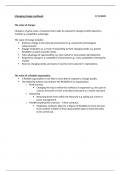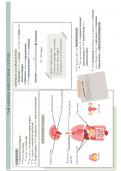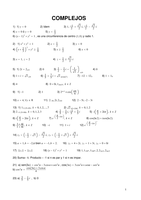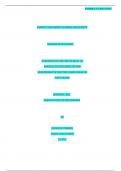Problem 1: Eyewitness memory (Accuracy, consistency, completeness)
*Accuracy = correctness
*Granularity = precision = coarseness
Ackerman (2008) Control over grain size in memory reporting – with and without
satisficing knowledge
People can answer questions at different levels of granularity (= precision or
coarseness of the answer).
Different theories/ideas about granularity
1. Gist vs. verbatim memory
a. Grain size reflects the detail level of information that can be accessed.
2. Social-communication approach
a. The focus lies on cooperative pragmatic principles involved in explicit
and implicit communication when asking a question in a social
context.
b. People only tell you as much detail as is required
3. Meta-cognitive approach
a. Strategic behaviour is guided by personal and social goals (like social-
communication approach)
b. There are monitoring and control processes that underlie strategic
memory performance
Controlling the grain size is guided by:
- Correctness (accuracy)
- Informativeness
When there are doubts about the correctness of information, a more coarse answer
will be provided, which is less informative.
Satisficing model by Goldsmith
Respondents strive to provide as much information as possible as long as its
subjective probability of being correct satisfies to a reasonable minimum level (for
example, 80% of being correct).
, - Minimum-confidence criterion depends on relative incentives for
correctness and informativeness in a particular situation.
o High criterion means correctness is emphasized
o Low criterion means informativeness is emphasized
Relative expected-utility maximizing model
Respondents calculate the subjective expected utility of their answers at different
grain sizes. Then they compare the values and choose the answer whose utility is
maximal.
Criticism
- Satisficing model is asymmetric, because correctness is protected explicitly
through setting and adhering to a minimum-confidence criterion. Meanwhile,
informativeness is handled implicitly by providing the most precise answer.
- Research shows that if memory or knowledge about a topic is poor, but the
criterion is already set that people do not give a ridiculously coarse answer.
Instead, it results in overconfidence. People believe that their answers are coarse
enough to achieve a high accuracy rate while actually they are not. People also do
not want to provide extremely coarse answers, because they want to be
reasonably informative due to social norms.
Dual-criterion model
Two criteria:
1. Minimum-confidence criterion
2. Minimum-informativeness criterion: a minimum level of precision or
maximum level of coarseness is set. If the answer doesn’t adhere to this
criterion, it can be perceived as unacceptable or even cynical.
a. Different questions need different criterions
b. Perceived expectations of questioner (e.g. how much does s/he already
know about this topic?)
c. Self-expectations regarding topic (e.g. is it your expertise?)
d. Social norms; there are different contexts in which the same question
requires a different answer (e.g. where were you born?)
This informativeness-criterion is set after the question, but before answering the
question.
, Two theoretical knowledge states:
1. Satisficing knowledge: Knowledge of the topic is sufficient enough to
provide an answer that satisfies both criteria.
2. Unsatisficing knowledge: Knowledge of the topic is not sufficient enough to
satisfy both criteria.
Unsatisficing knowledge creates a deadlock, which results in people choosing to
violate the confidence criterion.
Experimental study
Hypothesis was that when people have unsatisficing knowledge they will either
choose the coarsest grain size that satisfies the information-criterion or they will
choose a middle ground that satisfies none of the criteria.
Experiment 1:
- People with low knowledge were overconfident and made a lot of violations
of the confidence-criterion despite having full control over the grain size of
their answer
Experiment 3:
*Accuracy = correctness
*Granularity = precision = coarseness
Ackerman (2008) Control over grain size in memory reporting – with and without
satisficing knowledge
People can answer questions at different levels of granularity (= precision or
coarseness of the answer).
Different theories/ideas about granularity
1. Gist vs. verbatim memory
a. Grain size reflects the detail level of information that can be accessed.
2. Social-communication approach
a. The focus lies on cooperative pragmatic principles involved in explicit
and implicit communication when asking a question in a social
context.
b. People only tell you as much detail as is required
3. Meta-cognitive approach
a. Strategic behaviour is guided by personal and social goals (like social-
communication approach)
b. There are monitoring and control processes that underlie strategic
memory performance
Controlling the grain size is guided by:
- Correctness (accuracy)
- Informativeness
When there are doubts about the correctness of information, a more coarse answer
will be provided, which is less informative.
Satisficing model by Goldsmith
Respondents strive to provide as much information as possible as long as its
subjective probability of being correct satisfies to a reasonable minimum level (for
example, 80% of being correct).
, - Minimum-confidence criterion depends on relative incentives for
correctness and informativeness in a particular situation.
o High criterion means correctness is emphasized
o Low criterion means informativeness is emphasized
Relative expected-utility maximizing model
Respondents calculate the subjective expected utility of their answers at different
grain sizes. Then they compare the values and choose the answer whose utility is
maximal.
Criticism
- Satisficing model is asymmetric, because correctness is protected explicitly
through setting and adhering to a minimum-confidence criterion. Meanwhile,
informativeness is handled implicitly by providing the most precise answer.
- Research shows that if memory or knowledge about a topic is poor, but the
criterion is already set that people do not give a ridiculously coarse answer.
Instead, it results in overconfidence. People believe that their answers are coarse
enough to achieve a high accuracy rate while actually they are not. People also do
not want to provide extremely coarse answers, because they want to be
reasonably informative due to social norms.
Dual-criterion model
Two criteria:
1. Minimum-confidence criterion
2. Minimum-informativeness criterion: a minimum level of precision or
maximum level of coarseness is set. If the answer doesn’t adhere to this
criterion, it can be perceived as unacceptable or even cynical.
a. Different questions need different criterions
b. Perceived expectations of questioner (e.g. how much does s/he already
know about this topic?)
c. Self-expectations regarding topic (e.g. is it your expertise?)
d. Social norms; there are different contexts in which the same question
requires a different answer (e.g. where were you born?)
This informativeness-criterion is set after the question, but before answering the
question.
, Two theoretical knowledge states:
1. Satisficing knowledge: Knowledge of the topic is sufficient enough to
provide an answer that satisfies both criteria.
2. Unsatisficing knowledge: Knowledge of the topic is not sufficient enough to
satisfy both criteria.
Unsatisficing knowledge creates a deadlock, which results in people choosing to
violate the confidence criterion.
Experimental study
Hypothesis was that when people have unsatisficing knowledge they will either
choose the coarsest grain size that satisfies the information-criterion or they will
choose a middle ground that satisfies none of the criteria.
Experiment 1:
- People with low knowledge were overconfident and made a lot of violations
of the confidence-criterion despite having full control over the grain size of
their answer
Experiment 3:

